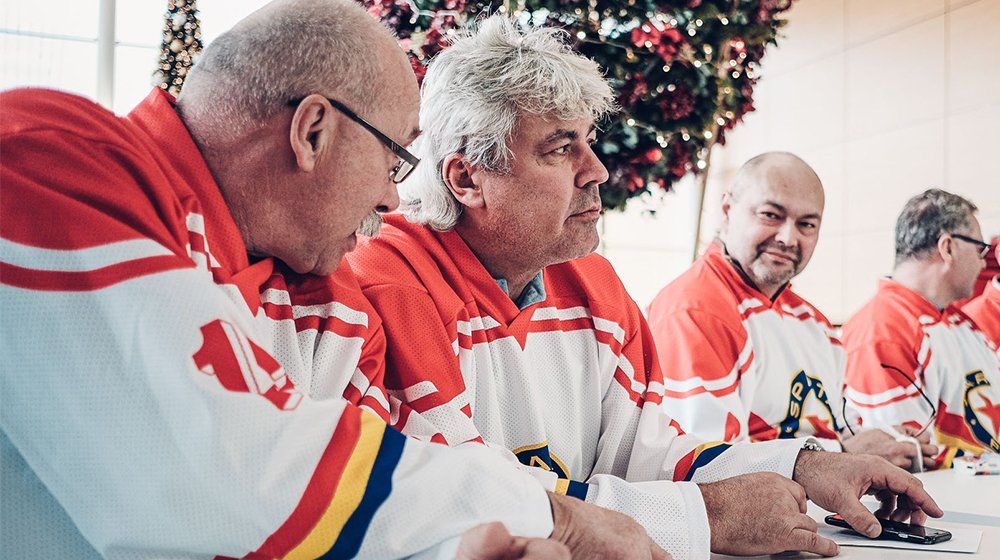Leo Gudas tried hockey in five European countries as a decisive national team defender after the fall of the Iron Curtain. As a coach, he has already managed to enroll Romania and Hungary in his CV. “I enjoy traveling and exploring new places,” says Radek Gudas, a father of the Florida Panthers. It is in the southern United States that it is enjoying its June days.
“I just came from the sea, but the hurricane season is just starting here. It’s been raining for 24 hours recently,” Leo Gudas said on the phone at the beginning of the interview.
Florida and his son Radek spent an excellent basic part of the NHL and entered the playoffs as the best team on the Eastern Conference. She managed the first round with Washington, but she clearly lost to Tampa’s defenders 0: 4.
“Radko had a birthday on Sunday, but he was already celebrating them in the Czech Republic. I extended my stay in Florida. I watch hockey on TV, I’m close to Ondra Palát, with whom Radko played on a farm and in Tampa, and Honz Rutt, that I had in Chomutov, “Gudas Sr. mentions.
“It’s nice that we still have Czech boys in the game,” he continues. Filip Chytil of the New York Rangers is fighting Tampa with Palát and Rutt. And after Colorado’s advance with Pavel Francouz, it is already certain that one of the Czechs will reach the Stanley Cup this year as well.
Leo Gudas has spent five seasons since 2016 in the Erste League, which brings together eight Hungarian and three Romanian clubs. He experienced better and worse times in the hockey development environment, and his last year was marred by an unconventional strike.
Do you already know where your next coaching steps will lead?
I do not know yet. Something will silver up. Some things are coming up, but I don’t have anything specific on the table yet.
How was last season in Dunaújváros, Hungary?
Very interesting. The owner decided to go the way of big savings, we had a team of Hungarian players and only later we added some foreigners who helped us a lot. We were penultimate before Christmas, but I got a covid and I couldn’t be with the team. The son’s owner took it over and then the season didn’t go well.
The team was taken over by Zsolt Azari, an inexperienced coach at the age of 35?
He still played with us last season, so he really had no experience. (smile) But otherwise I don’t rate it badly that year, I think I was able to help many young boys to make a hockey move.
In the end, it was the last eleventh place in the Erste League, as in the previous season. What was the work from this point of view? Did you know in advance what you are going to do in Dunaújváros?
I knew it. In the first season, I came in December and we had a problem with goalkeepers who did not perform as they should. The team suffered a big loss, it could not be downloaded. And this year, how to say it politely? In short, when I returned to the team after the covid, it was completely disguised. I worked with him for four months and the owner’s son dug everything over within three weeks. System, tactics, composition of fives. The team fell apart.
You couldn’t consult with him remotely?
I had my assistant there, but he didn’t have much chance of doing anything against the owner’s son. It’s a shame, because it started to work before Christmas, we played some good matches. The new coach buried it. When I returned, we were left with a match against tough opponents, who have a lot of foreigners on their rosters. We were no longer entitled.
Under what conditions does a foreign coach work in Hungary?
Some have good training conditions, others less. In Dunaújváros, it was not much from this point of view, until in the second season we got a gym. Otherwise, there is a nice area around the stadium, but they can’t use it. They have a winter and football stadium, a handball hall, and other outdoor sports grounds. But you are struggling with peculiarities that cannot be moved. I tried to work on things that Radek and I had been working on, for example, fifteen years ago. They looked at it as news.
What was it about?
Basically, hockey is not an endurance sport, but a speed one. It’s been known for a long time. The methods of training in the summer are completely different than they used to be. It changes a bit there Canadians, who started going to Hungary on a large scale, some even got citizenship. Russian players go to Romania again. However, large training reserves remain there.
In five seasons in Romania and Hungary, you have led quite diverse teams, with players of more than ten nationalities. How hard is it to cover such a party?
I have the great advantage of speaking English, German, Swedish and Russian. When a problem arose, we talked about it in the language so that the players really understood what I was talking about. Otherwise, as a coach, you have to create a certain atmosphere in the cabin and then you actually focus only on hockey, because in Romania you can easily catch up to a hundred matches per season. In addition to the joint Erste League, you also play the Romanian Cup at Christmas. Take the trip, it’s challenging.
How would you compare hockey and facilities in Romania and Hungary?
The Hungarians are much better off. In Romania, Brasov has a very solid stadium and overall conditions, but Csíkszereda and Gyergyói (two other Romanian participants in the Erste League, note red.) are worse off. There was no gym, in Csíkszereda we had to do everything outside the ice outside, in the winter. It was quite complicated.
At the same time, Csíkszereda has been very successful in recent years. In 2018, you won the Romanian league with it, which it dominated this year as well. She won this year and last year in the Erste League.
Most Romanian national team started there, the club already has such a history. He works well with foreigners, he hits reinforcements. It offers foreigners citizenship after a few years, so they did it with several Russians and Czechs Radim Valchař. These boys then count as Romanians, you can add other foreigners to them and suddenly you have a very good team.
At the national level, however, Romanians are not enough for Hungarians yet.
The Hungarians are still a little better, building more on their own players. In addition, in some sports, Hungarians are supported by the state in a way that is unbelievable. Halls are being built, and Prime Minister Viktor Orbán is pouring a huge amount of money into it.
This year, the Hungarian national team won promotion to the elite division of the World Cup. He will return there after seven years.
I remember playing the lower division championship in Budapest in 2018 and losing the promotion in the last minutes against Great Britain. At the time, they were clearly proving it. Now they have succeeded, the support seems to be bearing fruit. In addition, when Russia and Belarus are excluded, the chances of rescue in the elite division will increase slightly. For example, the British played a dignified role there, found out how to play at the highest level, and learned. The Hungarians could take them as a role model.
He will play in the group in Tampere against the Czechs, but also against the Austrians and the French. Can they compete with them?
It will be difficult, because the leagues in Austria and France are still better for me. Although the Hungarians went up a lot thanks to the foreigners.
The Hungarians and Slovenes originally even ran for the next World Cup, but the Hungarian side withdrew due to the absence of Russia and Belarus. What did you say?
I don’t know if the Hungarians would be ready. It’s a political decision, the hockey association probably couldn’t object much. When the order comes from above in Hungary, no one is arguing with anything.
You have been operating in Romania or Hungary since 2016, would you stay in this environment if you have a good offer, or is it pulling you elsewhere?
I would also like to try it in the Czech Republic, so far I am waiting for a good specific offer. But I don’t look so much at the environment. If something interests me, I’ll take it. Traveling and exploring countries is interesting to me. I made a lot of friends in Romania and Hungary. I also really liked the local nature in Romania, even though the locals don’t respect it as they should. It was interesting when once on the way from Brasov to Csíkszereda we met a bear walking on the sidewalk. He weighed maybe three hundred kilos, he was huge. The next day there was a warning in the newspaper.
As a player, you have gathered experiences from many countries, now you are continuing with it.
It is so. Then situations arise where, for example, in Galati, Romania, I remembered playing there with the youth team in the 1980s. I thought that maybe it was not possible, because the stadium had not changed at all during that time. (smile)
–


